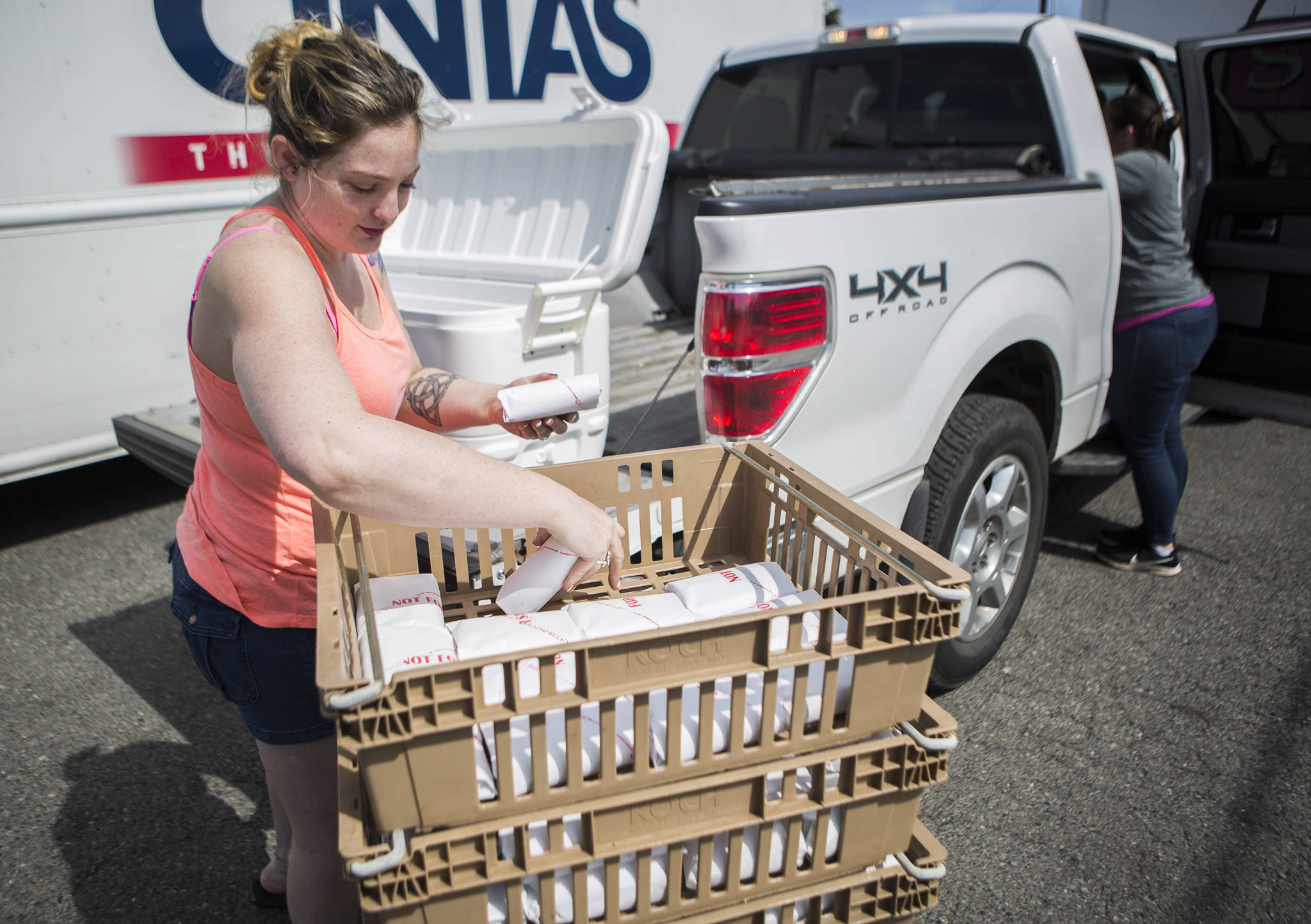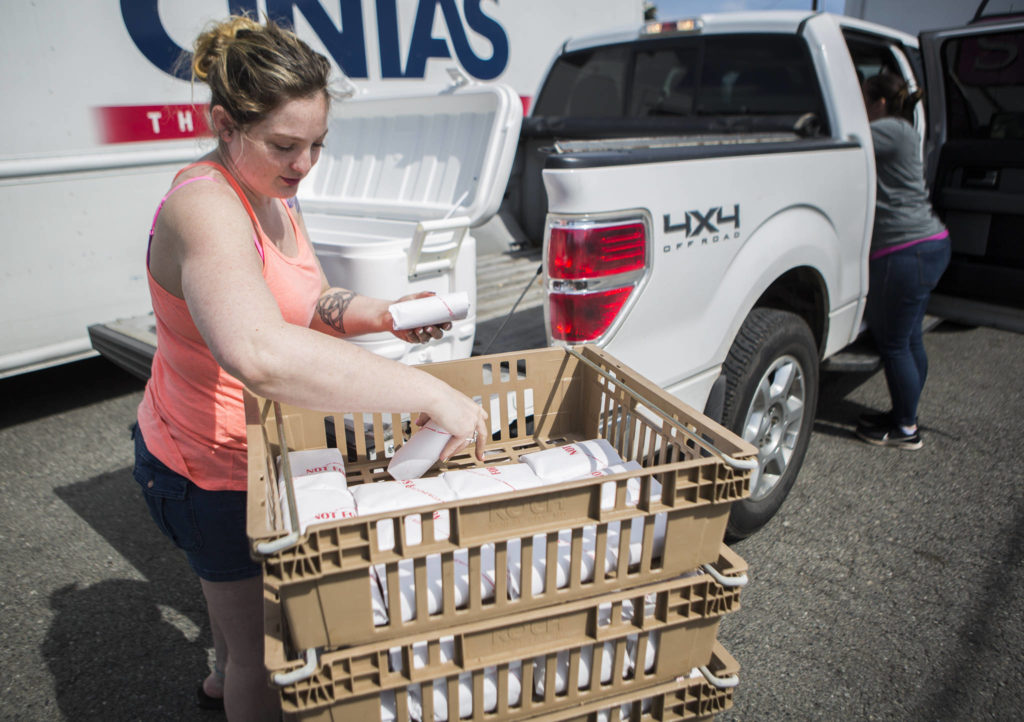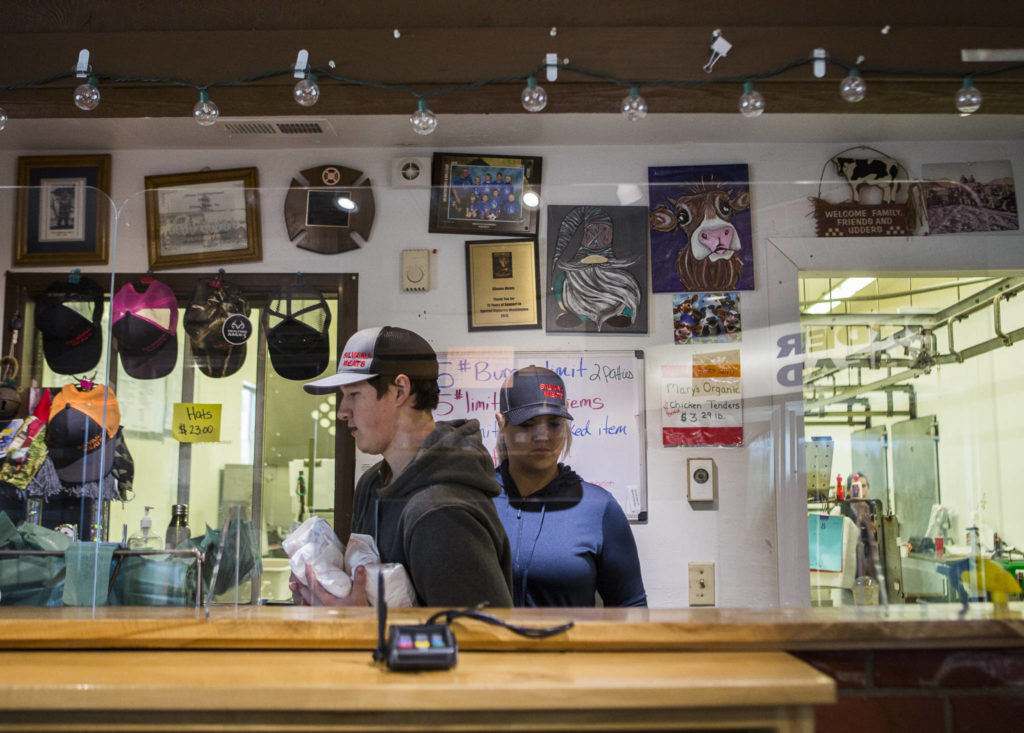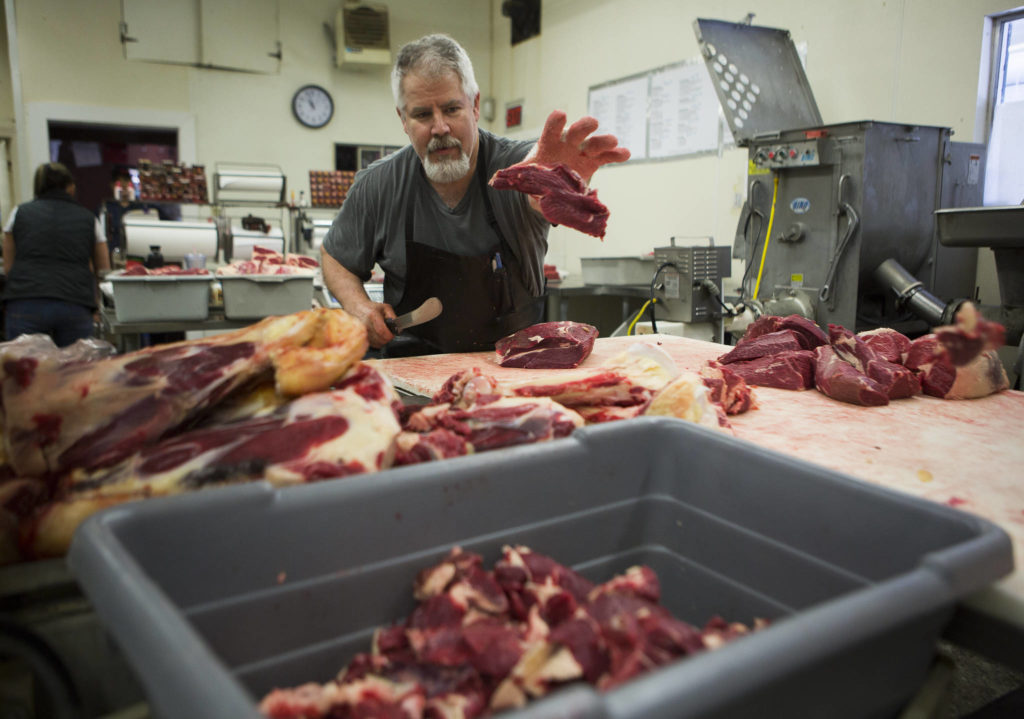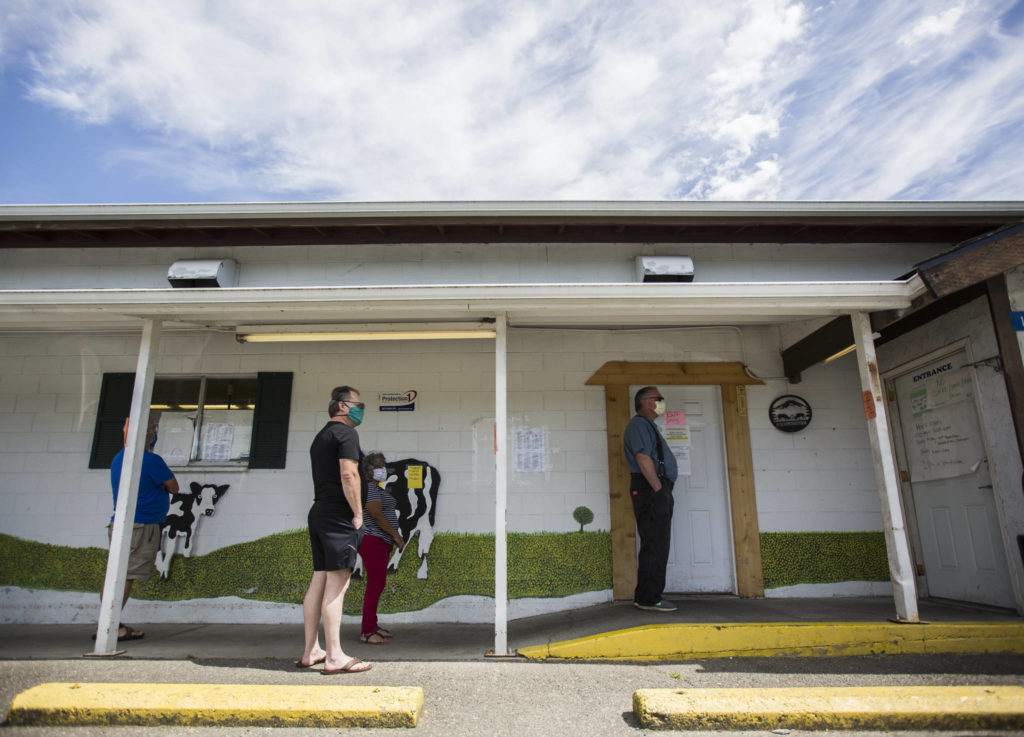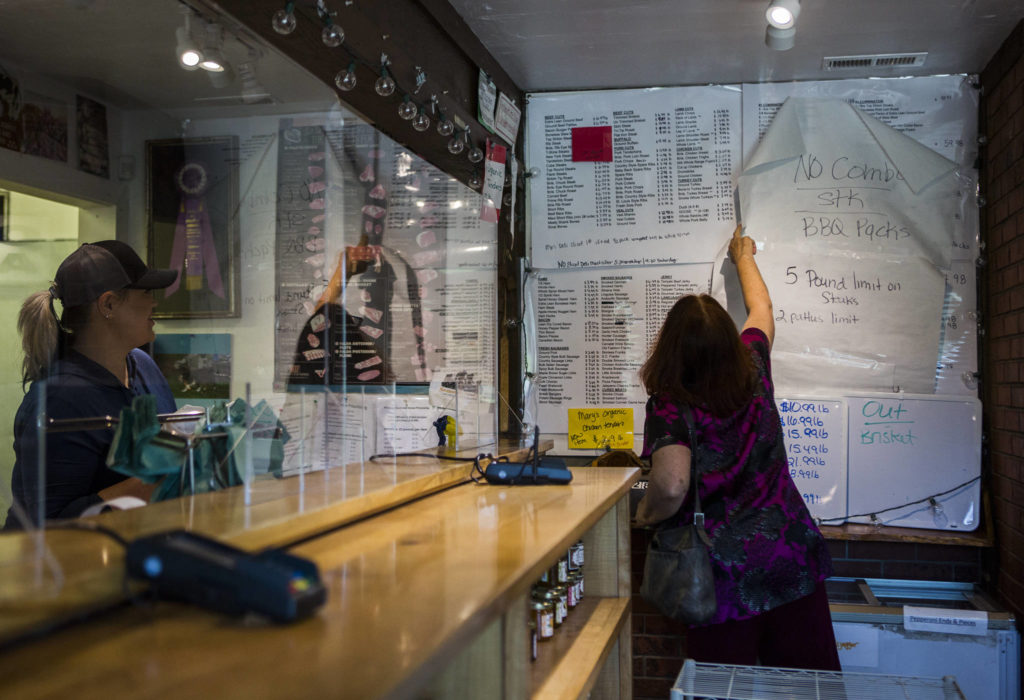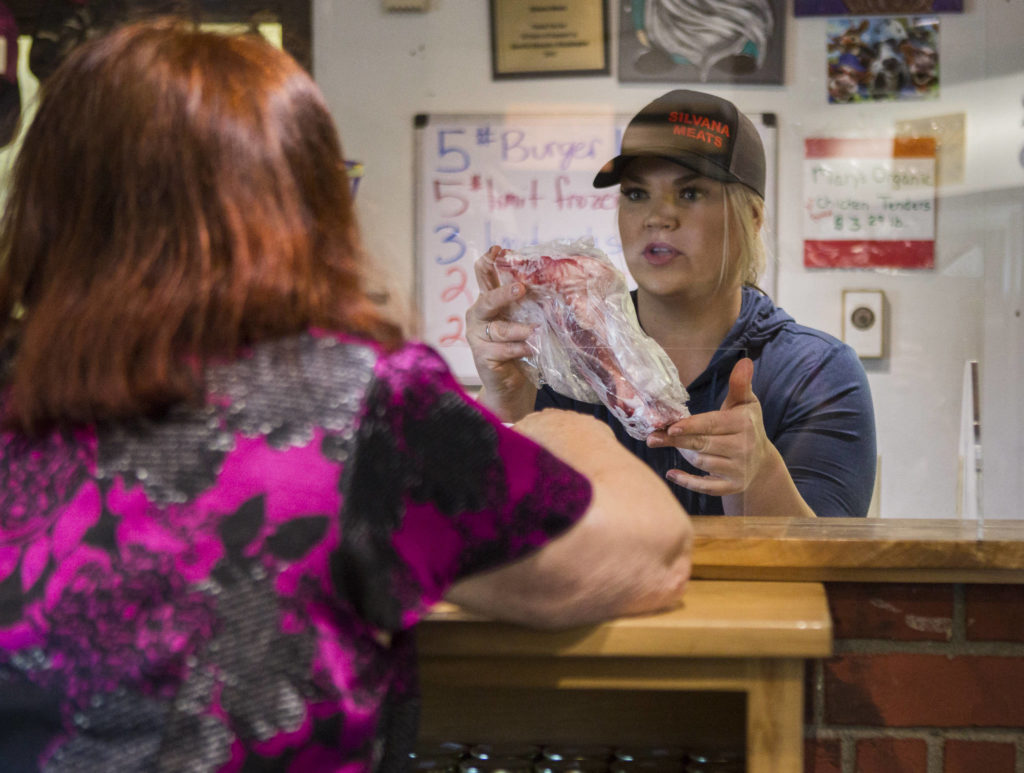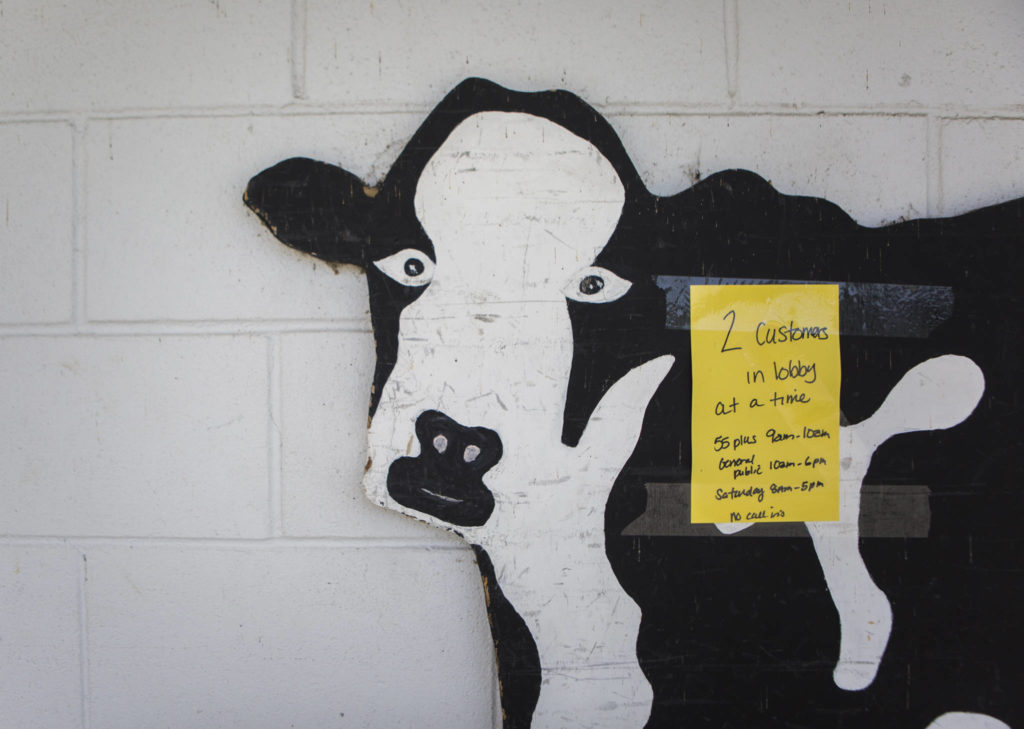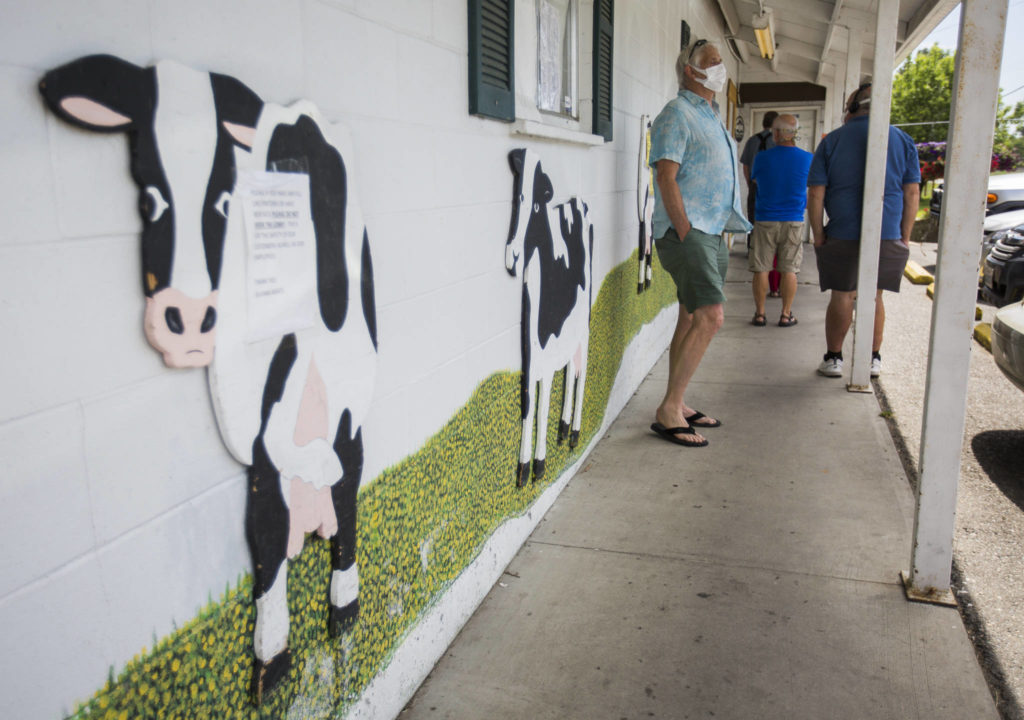SILVANA — A line of masked customers formed on the stoop of Silvana Meats recently as patrons waited their turn to purchase cuts of farm-fresh meat.
The rural butcher shop has drawn a crowd every day for nearly the past two months, manager and co-owner Teresa Faulkner said. It’s not uncommon nowadays for the store to run out of product before the day is over.
“People are hoarding because they think they’re not going to be able to buy any meat,” Faulkner said. “They’re freaking out.”
Customers can purchase up to five pounds of frozen meat, including buying a share of a whole cow.
The shop is going through in a day what it would normally in a week, her husband Kevin Faulkner said.
Snohomish County consumers aren’t just scrambling for meat, they’re buying up other local goods as well.
People started reaching out directly to area farmers early on in the coronavirus pandemic, Snohomish County agricultural coordinator Linda Neunzig said. They wanted to supplement what they couldn’t find at big box stores.
“I think people get nervous when they walk into a grocery store and the shelves are empty,” Neunzig said. “They get nervous when they talk about supply chains in the news.”
That fear has driven many consumers toward local producers like Vince Caruso of Caruso Farms between Snohomish and Monroe.
“We are seeing unprecedented demand and are unable to meet most of it,” Caruso said.
He grows about 35 varieties of different vegetables on 10 acres and sells them through produce boxes, at markets and to a food hub.
“I think people have always known local food is higher quality and safer,” Caruso said. “I think the reason why we’ve never gotten a big switch is because it’s not as convenient as going to a grocery store. And now all of a sudden the grocery store isn’t so convenient.”
Caruso sells some of his produce on the wholesale market through a distributor called Farmstand Local Foods.
The pandemic has drastically changed how that market looks, owner and operator Austin Becker said. Sales to restaurants and corporate kitchens have largely disappeared, giving way to retail packaging tailored for individual consumption.
Becker points to egg sales to demonstrate the shift.
He went from selling 20 cases of eggs shipped in flats each week to almost none. Then, demand skyrocketed for cartons of eggs sold to individual customers. He started selling 300 to 400 cartons each week.
“All our packaging has shifted that way,” Becker said.
Farmstand has started selling smaller packaged salad mixes, rather than bulk greens. Sales are up at least double from pre-pandemic numbers.
COVID-19 has changed how consumers view local food, Becker said. It’s no longer a luxury, but a matter of security.
On his dairy farm near Snohomish, Jeremy Visser said the scent of Lysol has overpowered the other pungent smells of a dairy farm for weeks.
Visser sells his product to the Darigold cooperative. Butter, cheese and milk sales have gone up considerably.
“It’s a change in consumer patterns,” he said. “More meals will be consumed at home now.”
It’s not enough to offset the sales lost from restaurants, though.
With multiple dairy farms throughout northwest Washington, Visser had the capacity to meet the changing demand. But other parts of the supply chain haven’t been able to keep up.
The products get loaded by a truck driver, unloaded by shipping agents and then stocked at stores.
“We can definitely produce and bottle milk faster than those other steps in the line can act,” Visser said.
To anyone in the diary business, the concept of isolating to reduce virus spread is old news.
It’s something they do every day to protect young calves from any older cows who may be sick.
“Isolating your vulnerable is the first thing you do,” he said.
The pandemic has also inspired a host of Snohomish County residents to try their hands at growing their own food.
At the Bailey Farm in Snohomish, compost sales soared by at least a third, Barb Bailey said. Much of it went to folks putting in gardens.
“There was this kind of almost panic right when the restrictions started mid-March,” she said. “They’d offer me toilet paper if I could get it delivered.”
In May, the meat industry’s ability to process product plummeted when the virus caused shutdowns at several U.S. production plants.
That disruption sent a shock wave of panic down to consumers as some chains like Costco limited meat sales.
They flocked to local producers like Neunzig’s.
Her beef, lamb and pork sales have at least doubled, she said.
Much of that is from new customers, driven to the farm’s on-site store by empty shelves at grocery stores.
For the most part, Neunzig said they’ve been able to keep up with the demand.
“The animals are there,” she said. “We just need a little time to catch up then it’s all good.”
Other local meat producers are seeing a similar rush.
In the last six weeks, Eric Fritch has sold his entire year’s worth of product from his beef farm in Snohomish.
“We’ve turned away more people than we’ve taken orders from,” he said.
All the cattle at Chinook Farms are grass fed.
Fritch said many of his new customers aren’t necessarily looking for that boutique product — they’re just looking for something to put in the freezer.
“It’s just literally panic buying,” he said.
Like many small farmers in Snohomish County, Fritch doesn’t have the infrastructure in place to support such a spike in demand.
In Fritch’s case, it takes nearly three years to get beef on the market. He chooses cattle, breeds them, waits nine months for a calf and another two years before that calf is market-size.
Produce farmers plant crops months ahead of time and plan for them even further in advance.
“The sad part of it is that we don’t have the infrastructure in place nor have we had the demand in the past to make a dent in the overall supply chain,” Fritch said.
There’s also the possibility some of the new local food customers will fall into old purchasing habits as time goes on.
“I think there absolutely could be a shift in the customers who just genuinely couldn’t get what they needed at the grocery store,” Becker said.
Part of Snohomish County’s plan for pandemic recovery will include bolstering local food systems.
A portion of the $25 million in Coronavirus Aid, Relief and Economic Security (CARES) Act funding allotted to Snohomish County will go toward connecting neighborhoods with low food access to local farms.
Plans for the program are still forming, but the county hopes to use unemployment rates and SNAP data to identify parts of the county where access is slim. A handful of pilot “corner stores” will assemble weekly with boxes of fresh fruits, vegetables and proteins.
“If we’ve got farmers and they’re growing food specifically for people in Snohomish County, it takes so many steps out of the picture,” Neunzig said. “It’s not going through multiple hands before the end user receives it.”
The coronavirus pandemic has proven just how fragile the commercial food industry is.
As the county plans for a path toward recovery, Neunzig said it’s necessary to ensure local food systems survive to pick up the slack.
Becker hopes the pandemic can even act as a catalyst to grow them.
“It’s hard once you start thinking about the food chain to go back to not purchasing local,” he said. “It’s sad it took a crisis to get there.”
Julia-Grace Sanders: 425-339-3439; jgsanders@heraldnet.
Talk to us
> Give us your news tips.
> Send us a letter to the editor.
> More Herald contact information.
